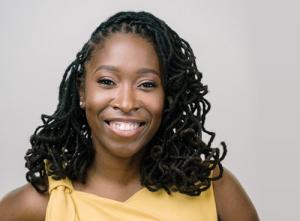Charger Help!
Kameale Terry is the CEO of Charger Help!
In recent years, EPRI has taken on the biggest energy issues of our time. Here comes another big one, the Climate REsilience and ADaptation initiative, or Climate READi for short. This project aims to harden systems for the more adverse environmental conditions ahead.

PUF spoke with Southern Company Services CEO Stan Connally and PG&E EVP-Engineering, Planning & Strategy Jason Glickman. An entrepreneur shared solutions too, with the addition of ChargerHelp! CEO Kameale Terry in the discussion.
PUF's Steve Mitnick: What's the latest at your company?
Kameale Terry: What I'm most excited about is a product we recently launched. We call it reliability as a service, and it provides a peace of mind for customers that own and/or operate electric vehicle charging stations.
 ChargerHelp! Co-Founders Evette Ellis (standing) and Kameale Terry.
ChargerHelp! Co-Founders Evette Ellis (standing) and Kameale Terry.
The product is a fixed price. It allows for truck roll, so it's folks that go on site, and for utilities to be able to understand, no matter which network provider or hardware they're using, what is the true uptime of one station. It took a lot of data for us to feel comfortable offering that solution.
Second, we all are pumped about this Tesla deal. The deal was a validation to the company, what we've been building and also to our quality of work, so that's equally as exciting.
PUF: What are you doing with Tesla?
Kameale Terry: Tesla built about thirty-five thousand destination charging stations, which are level-two stations. They technically are not owned and operated by Tesla but belong to the hotels they're located at.
However, as we have seen from other EV charging network providers, if your logo is on something, an EV driver may assume you are responsible for that hardware. Tesla wanted us to go out and audit this infrastructure to provide specific data points on issues they're interested in, and also to fix any of the stations that were broken or having issues.
The coolest thing about this is that they then allow us to work with that hotel to offer reliability as a service as an approved Tesla vendor. That is a huge market opportunity, and it speaks to how incredible this product is that we launched.
PUF: How did this come about?
Kameale Terry: I have been in this industry almost nine years, and I started in the industry as what is called EV driver support. I would field calls from folks who either didn't know how to charge their car, were having an issue at the station, or may just have had questions.
Starting at the ground level in this space, I was privy to interesting problems that we were seeing across all manufacturers where it was it difficult, one, to find a workforce to fix stations when they broke, and two, for the open system, which most of the infrastructure is, and it wasn't easy to solve some of the problems we were seeing out in the field.
When I decided to launch ChargerHelp!, I thought it was a cool opportunity to stand up local workforces and utilize technology to solve a critical issue, because the industry is trying to push toward mass EV adoption.
PUF: You've created good jobs to fix charging stations and keep them well maintained.
Kameale Terry: Absolutely. EV charging stations are the beginning of publicly deployed Internet of Things assets, so when we think about the workforce of the future, we have to think about folks that, yes, could do field service and will be out in the field, but must have an intermediate understanding of software.
How do we upscale our current field service workers in order to be more than people who say, I go clean stations? No, you actually solve a software issue. We were and still are excited about the type of workforce we get to create, where they're driving tremendous value, and we're able to pay them for that value they're driving in the industry.
PUF: Having the charger fleet around the country working well is critical to the electric utility industry. Have utilities been supportive? Do you have relationships with companies interested in electrification of cars and trucks?
Kameale Terry: Sure. It's been exciting to see the support of utilities across the United States, from the reliability as a service product to most important, workforce development. We recently did a training program with Georgia Power in Atlanta, where we partnered with Georgia Technical College to train folks on technician maintenance. Then we were able to hire two folks from that class and are working toward contracts in the Georgia area.
It's been a win-win space for utilities, getting the workforce development arms set up and also being able to ensure uptime and reliability of a large investment that they're making.
PUF: For other utilities around the country, can they support you and help what you're trying to establish?
Kameale Terry: Absolutely. The best part of what we're doing with EV charging is we're switching to electricity as a fuel. We see utilities are playing the most crucial role in this, specifically around the maintenance, uptime, and holding folks accountable.
We welcome utilities to partner with us to ensure their infrastructure is properly working, and we look toward utility foundations to help us build out the workforce of the future.
PUF: Where are you trying to take your company in two, three, or five years?
Kameale Terry: Detroit, and a couple of other cities, they've been exploring roads as EV chargers, that an electric vehicle will be able to drive on a road and the car will be able to charge.
The most interesting thing about that is now pavement is smart technology. We're excited, as we look toward smart cities and more deployment of decentralized technology, we see that what we built at ChargerHelp! will be significantly applicable for the future.
It's not only, one, to understand how and why these stations, or these Internet of Things assets, break, and how we scan solve software issues in the field, but then also how we can re-skill folks and get them to be the workers who are taking care of this bright new future.
PUF: What got you to this point, or do you have some secret sauce of being a leader and an entrepreneur?
Kameale Terry: I honestly think my secret is my upbringing. I'm from South/Central Los Angeles. My dad was an entrepreneur, and my mom was a special education teacher assistant, and they taught me that I have the opportunity to drive good impacts.
My parents are big on us being able to impact the world in some way, which may just be being nice to someone or dreaming about something big. My dad always taught me, you shoot for the stars, so even if you fail, you still fall in the mountain.
I think growing up with this idea that there is nothing I can't accomplish, helps me to have a level of ignorance is bliss. I'm always thinking, sure I can do that. I'm forever grateful to my parents and the way that they raised my siblings and me.
Climate READi conversations:


